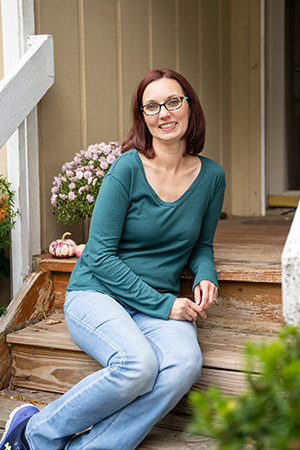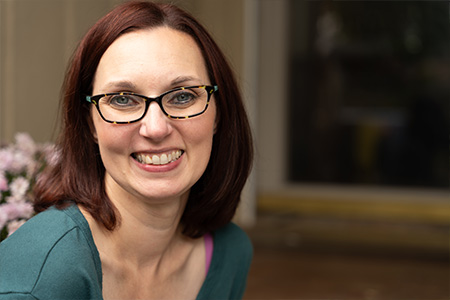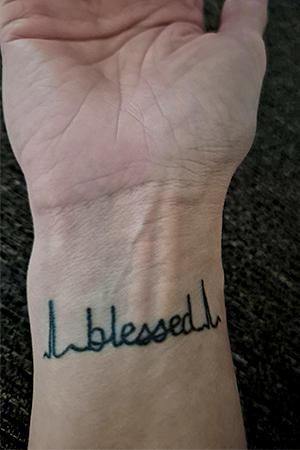Persevering Through the Unexpected
At 44, Kelly Weldron thought she had life figured out.
 Living in Rochester with her husband and two young children, she had built a fulfilling career as a Certified Nursing Assistant. She had also already battled through her own major health issue.
Living in Rochester with her husband and two young children, she had built a fulfilling career as a Certified Nursing Assistant. She had also already battled through her own major health issue.
A long healthcare journey
When she was 27, Kelly noticed numbness in her face that led to a shocking diagnosis: multiple sclerosis (MS).
In the years since, Kelly has thrived. When others ask how she’s doing so well with a condition that can be debilitating for many, her answer is simple: “I refuse to let a diagnosis determine how I live my life.”
The resilience she showed in managing her MS would prove crucial when facing her next health challenge.
In September 2024, during a routine visit to her neurologist, her care team checked Kelly’s vitamin D levels, which were abnormally low. She was referred to her primary care provider. They checked her heart rate and blood pressure, which were also dangerously low.
“My heart rate was in the 40s,” Kelly says. “And they couldn’t measure my blood pressure.”
Her care team did one electrocardiogram (EKG). Then another one.
“I looked at my doctor’s eyes when she read the results and could see the terror in her face," Kelly says. “She asked me, ‘Do you have anything else going on today?’ I told her I had a massage scheduled, and she told me to cancel it.”
Her doctor’s office is in the medical building of Henry Ford Rochester Hospital, and they wheeled Kelly down to the hospital’s emergency room.
Another shocking diagnosis
After 24 hours of monitoring, Kelly was referred to Jelena Arnautovic, D.O., Medical Director of the Women’s Heart Clinic at Henry Ford Rochester Hospital, who reviewed her medical records and initiated a comprehensive workup.
After a thorough evaluation, Dr. Arnautovic recognized the seriousness of Kelly’s condition and promptly ordered advanced diagnostic testing, including a cardiac CT scan and cardiac MRI. These tests provide a more detailed understanding of the heart’s structure and function.
As Kelly’s symptoms worsened at home, Dr. Arnautovic advised her to proceed immediately to the emergency department, where Kelly underwent additional critical assessments, including an initial electrophysiology study. This further testing led to a final diagnosis: Kelly had ventricular tachycardia, which is a quivering in the heart’s lower chambers. It requires prompt treatment and continued care.
Kelly also had a very rare and serious form of ventricular arrhythmia called arrhythmogenic mitral valve, which is associated with mitral annual disjunction—a structural heart condition where part of the mitral valve separates from the left ventricle. This potentially life-threatening condition increases the risk for sudden cardiac arrest.
While heart disease ran on both sides of her family, Kelly had believed she was at low risk.
“I was shocked,” Kelly says. “I didn’t have any major symptoms or previous heart issues. And the symptoms I did have were so minute I didn’t recognize them. For example, I was working out at the gym one day when my heart started racing. I thought it was just due to the exercise. Then I experienced this again in the middle of the night. I go to sleep watching crime shows, so I thought maybe it was just a nightmare.”
Two life-saving procedures
 Dr. Arnautovic referred Kelly to her colleague, Madar Abed, M.D., Medical Director of the Henry Ford Rochester Hospital electrophysiology program, who proceeded with a definitive electrophysiology study. Given that Kelly’s condition was so serious, the first step would be to get a wearable defibrillator, a portable, external, battery-powered device that can deliver a shock if the heart’s rhythm gets out of sync. In December 2024, Kelly completed the necessary workup with her multidisciplinary team and got this device.
Dr. Arnautovic referred Kelly to her colleague, Madar Abed, M.D., Medical Director of the Henry Ford Rochester Hospital electrophysiology program, who proceeded with a definitive electrophysiology study. Given that Kelly’s condition was so serious, the first step would be to get a wearable defibrillator, a portable, external, battery-powered device that can deliver a shock if the heart’s rhythm gets out of sync. In December 2024, Kelly completed the necessary workup with her multidisciplinary team and got this device.
This served as a bridge, until Kelly underwent a permanent device implantation: the Aurora EV-ICDTM system. She was one of the first patients at Henry Ford Rochester Hospital to get this newer, first-of-its-kind, smaller device, which is designed for people like Kelly who have an arrhythmia and are at risk for sudden cardiac arrest. The device includes both a defibrillator and antitachycardia pacing (ATP) technology to help control abnormal heart rhythms.
This differs from traditional implantable cardioverter-defibrillators (ICDs), because it offers extravascular (EV) therapy, meaning it delivers life-saving shocks, ATP and pacing without placing leads inside the heart or blood vessels.
“They told me that it can track my heartbeats, and that if my arrhythmia gets out of whack, the device can notify my care team to send an ambulance,” Kelly says.
The procedure went smoothly. Kelly was in the hospital for 24 hours, then finished her recovery at home.
“The device is located on my left side, underneath my arm,” Kelly says. “I had to sleep upright for about two weeks while I got used to it, then could lay on my right side.”
A symbol of her gratitude
 Since then, Kelly has had several follow-up appointments with her Henry Ford Health care team to make sure the device is working correctly. Other than experiencing some temporary numbness in her arm, Kelly is back to living her life.
Since then, Kelly has had several follow-up appointments with her Henry Ford Health care team to make sure the device is working correctly. Other than experiencing some temporary numbness in her arm, Kelly is back to living her life.
“My husband and I have season tickets for the Tigers, and my littlest is seriously getting into baseball,” she says.
She’s also grateful for the care she’s received from her Henry Ford Health team.
“It was a collection of so many people, not just one person,” Kelly says. “Amazing doctors, the nurses, the tech who did my EKG. It felt like it took a village to figure out what was going on with me, since I wasn’t high-risk and didn’t have any major symptoms.”
Kelly recognizes how lucky she is, and is thankful that her Henry Ford Health team recognized her life-threatening condition in a timely manner, and that they were able to use a multidisciplinary care approach, including advanced cardiac imaging and specialized cardiology and electrophysiology treatment, to give her a second chance.
After her experience, Kelly also took a huge step to show her gratitude.
“I’m grateful to just be here, and that I’ll get to see my kids grow up,” she says. “I’m not big into tattoos, but I became obsessed with getting one to mark this experience. So, I got a tattoo on my wrist that shows my EKG readout with the word ‘blessed’. Because I truly am.”
.svg?iar=0&hash=F6049510E33E4E6D8196C26CCC0A64A4)

/hfh-logo-main--white.svg?iar=0&hash=ED491CBFADFB7670FAE94559C98D7798)
